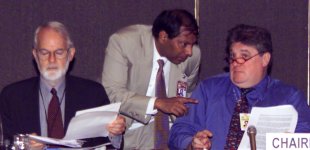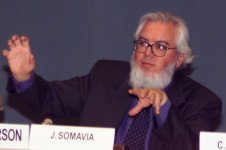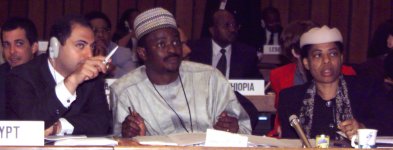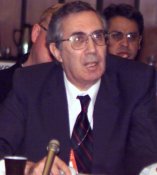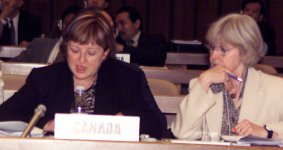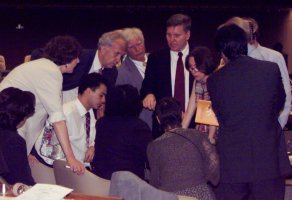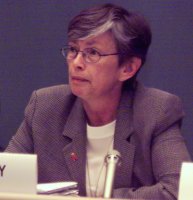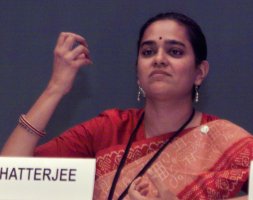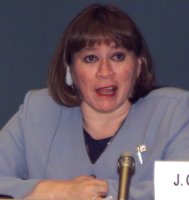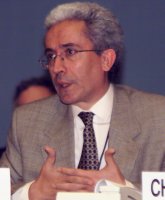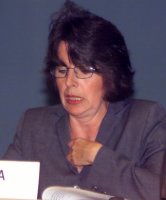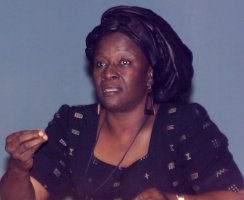|
|
Negotiations: Working Group I
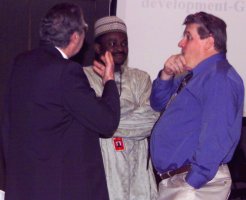 Delegates
agreed to language on the following paragraphs, negotiated in an
informal informal meeting under Chair Maquieira (pictured at
the left with the Portugal and Nigeria): paragraph 2, on governance;
paragraph 5, on rights; 6 ter, on regional guidelines; 10(a), on
addressing excessive volatility of short-term capital flows, including
consideration, inter alia, of a temporary debt standstill; paragraph
13, on the international economic decision-making process, including
a reference to ensuring the transparency and accountability of IFIs;
paragraph 16, with reference to bearing in mind that corporations
must abide by national legislation, encourage corporate social responsibility
by promoting awareness (16(a)) and providing a just and stable framework
(16(b)); and paragraph 19, on enhancing international cooperation,
including burden-sharing, inter alia, to countries affected by natural
disasters. Delegates agreed to language in 8(c), on access to products
of developing countries, except for references to services and EIT
countries. A reference to the Global Compact in 16(c), on enhancing
partnerships, also remains bracketed. Delegates
agreed to language on the following paragraphs, negotiated in an
informal informal meeting under Chair Maquieira (pictured at
the left with the Portugal and Nigeria): paragraph 2, on governance;
paragraph 5, on rights; 6 ter, on regional guidelines; 10(a), on
addressing excessive volatility of short-term capital flows, including
consideration, inter alia, of a temporary debt standstill; paragraph
13, on the international economic decision-making process, including
a reference to ensuring the transparency and accountability of IFIs;
paragraph 16, with reference to bearing in mind that corporations
must abide by national legislation, encourage corporate social responsibility
by promoting awareness (16(a)) and providing a just and stable framework
(16(b)); and paragraph 19, on enhancing international cooperation,
including burden-sharing, inter alia, to countries affected by natural
disasters. Delegates agreed to language in 8(c), on access to products
of developing countries, except for references to services and EIT
countries. A reference to the Global Compact in 16(c), on enhancing
partnerships, also remains bracketed.
|
|
Working
Group III Chair Bagher Asadi and Chair Maquieira decide to postpone
negotiations on the Political Declaration until noon on Friday at
the earliest.
|
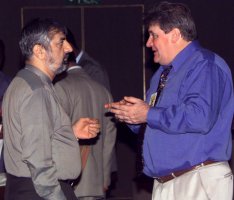 |
|
|
Egypt,
Nigeria and Jamaica |
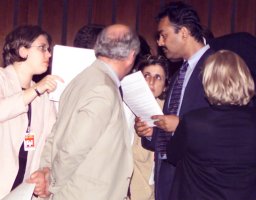 Under
Commitment 7 on Africa and LDCs, delegates negotiated paragraph
87 on the basis of the Chair's proposal, noting it formed a package
with paragraph 95. JAPAN could not accept reference to "countries
that have not already done so" in language on bilateral debt cancellation,
and proposed "welcome the/stress the importance of the implementation
of bilateral debt relief." BANGLADESH (pictured here with the
EU) suggested, and the G-77/CHINA supported, "implementing bilateral
debt relief arrangements by creditor countries." In a later session,
delegates accepted language in 87(a) on implementing appropriate
debt relief initiatives that can lead to a sustainable solution
to debt burdens. The new formulation dropped a prior reference to
HIPC. In paragraph 95, on bilateral debt relief, JAPAN agreed, ad
ref, that it could accept language on encouraging creditor countries
to implement these arrangements. After BANGLADESH expressed concerns
about conditionality, delegates agreed on a reference to stressing
that debt relief should contribute to national development objectives
including poverty eradication. Under
Commitment 7 on Africa and LDCs, delegates negotiated paragraph
87 on the basis of the Chair's proposal, noting it formed a package
with paragraph 95. JAPAN could not accept reference to "countries
that have not already done so" in language on bilateral debt cancellation,
and proposed "welcome the/stress the importance of the implementation
of bilateral debt relief." BANGLADESH (pictured here with the
EU) suggested, and the G-77/CHINA supported, "implementing bilateral
debt relief arrangements by creditor countries." In a later session,
delegates accepted language in 87(a) on implementing appropriate
debt relief initiatives that can lead to a sustainable solution
to debt burdens. The new formulation dropped a prior reference to
HIPC. In paragraph 95, on bilateral debt relief, JAPAN agreed, ad
ref, that it could accept language on encouraging creditor countries
to implement these arrangements. After BANGLADESH expressed concerns
about conditionality, delegates agreed on a reference to stressing
that debt relief should contribute to national development objectives
including poverty eradication.
|
|
|
Debate
on paragraph 105(c) focused on whether transparency and accountability
is required for both governments and IFIs and whether to make the
sub-paragraph into a separate paragraph. The EU (pictured at the
left) said the statement suggests IFIs would govern countries,
but also wanted the text linked to national policy frameworks. The
G-77/CHINA suggested "ensuring transparency and accountability
by both governments and IFIs for improved efficacy of SAPs and social
development goals," but JAPAN said the link with social development
goals is unclear. The paragraph remains bracketed. |
|
Norway
expressed supported for the Chair's text on 104 on poverty reduction
strategies.
|
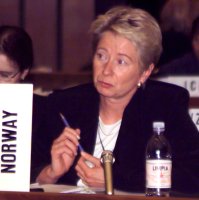 |
|
Working
Group II Chair Koors Richelle
|
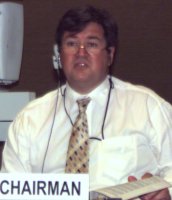 |
|
|
CANADA
(left) reformulated paragraph 66, on addressing armed conflict
causes, as new 66 bis. CUBA opposed reference to good governance,
specified "root" causes, called for elaboration of causes and added
Beijing text on, inter alia, human rights, territorial integrity,
political independence and non-intervention. The HOLY SEE (below)
called for reference to reduction of trade in arms and EGYPT to
termination of foreign occupation. No agreement was reached. |
|
In
revisiting the paragraph 66 bis, on addressing causes of
armed conflict to enhance civilian protection, CANADA proposed
a new formulation promoting elements that it perceived, from previous
discussions, as widely supported. CUBA suggested focusing
on "root" causes, and adding language referring to other elements
from Beijing+5, subparagraph 125 (b). The HOLY SEE reiterated
its desire to add "reduction in the trade of arms." The text remains
bracketed.
|
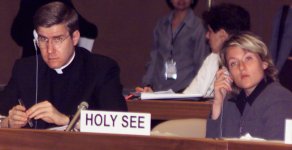 |
|
|
Delegates
discussing paragraph 45, on addressing employment issues of specific
groups. The G-77/CHINA, with others, advocated "migrant workers."
The EU, with CANADA, CYPRUS and JAPAN, opposed, and
called for a reference to "documented." Advocating deletion of the
paragraph's reference to migrants, the US specified documented
workers who have acquired the right to long term residence. No agreement
was reached. |
|
In
paragraph 69, on measures to end foreign occupation, the US
and EU (right) restated their preference to delete the paragraph.
It remains bracketed.
|
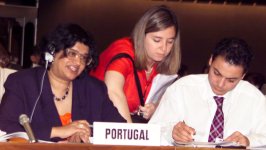 |
|
Chairman's Panel: Promotion
of Full Employment
|
|
Left
to right: Fackson Shamenda (President, International Confederation
of Free Trade Unions (ICFTU), Zambia), Mirai Chatterjee (Former
General Secretary, Self-Employed Women's Association (SEWA), India),
Ethel Blondin-Andrew (Secretary of State for Children and
Youth, Canada), Juan Carlos Aparicio (Minister of Labor and
Social Affairs, Spain), Chair Juan Somavia (Director General,
ILO), Carol Bellamy (Executive Director, UNICEF), Irena
Boruta (Deputy Minister of Labor and Social Policy, Poland),
and Advocate Dikgang Moseneke (Chairman, Telkom, South Africa)
|
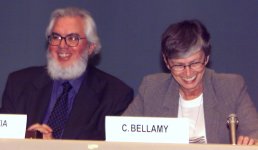 Juan
Somavia, ILO, highlighted the following: overcoming the feminization
of poverty; enterprises stimulate investment and growth, but workers'
rights must be respected; doing away with unwanted employment such
as child labor; focusing on older worker; taking advantage of local
communities and interest groups and organized labor and critical perspective
of NGOs; and decent work. He said that we all need to take an honest
look at what impact the current global economy is having on people
and that issues should be looked at through the eyes of the people.
Carol Bellamy, UNICEF, highlighted linkages between full employment
and child development and said full employment is necessary for child
development as it increases family income and enhances self-esteem
of parents which reduces the risk of violence against children and
their exploitation. She discussed the challenge of reducing child
labor, and said of an estimated 250 million children economically
active, between 50 and 60 million are the poorest of the poor: child
soldiers, girls in brothels, young bonded workers in factories and
fields, and domestic workers in the homes of the rich. Juan
Somavia, ILO, highlighted the following: overcoming the feminization
of poverty; enterprises stimulate investment and growth, but workers'
rights must be respected; doing away with unwanted employment such
as child labor; focusing on older worker; taking advantage of local
communities and interest groups and organized labor and critical perspective
of NGOs; and decent work. He said that we all need to take an honest
look at what impact the current global economy is having on people
and that issues should be looked at through the eyes of the people.
Carol Bellamy, UNICEF, highlighted linkages between full employment
and child development and said full employment is necessary for child
development as it increases family income and enhances self-esteem
of parents which reduces the risk of violence against children and
their exploitation. She discussed the challenge of reducing child
labor, and said of an estimated 250 million children economically
active, between 50 and 60 million are the poorest of the poor: child
soldiers, girls in brothels, young bonded workers in factories and
fields, and domestic workers in the homes of the rich. |
| Advocate
Dikgang Moseneke, Telkom, South Africa,
Carol Bellamy, and
In discussing self-reliance for women, Mirai Chatterjee, SEWA,
India, highlighted five essential strategies: strengthening and developing
employment opportunities; capitalization at the household level; capacity
building to stand firm in the competitive market; and social protection
and security. She noted the increasing number of rural workers taking
advantage of the internet and e-commerce, helping to get products
to the North. But she highlighted a contradiction between this and
the fact that many raw materials are difficult to get access to as
they are exported for the global market. |
|
Ethel
Blondin-Andrew (Secretary of State for Children and Youth, Canada)
discussed an active measures programme in Canada towards the reintegration
of workers, particularly those that have fallen by the wayside by
downsizing, etc, and highlighted specific training programmes aimed
at reintegration. Juan Carlos Aparicio (Minister of Labor
and Social Affairs, Spain) highlighted new measures being
taken in trying to reduce unemployment including social dialogue
between employers and employees. He emphasized collective bargaining
and organizing and said abusive short term contracts should be avoided.
Irena Boruta (Deputy Minister of Labor and Social Policy, Poland),
discussed examples from Poland as a country in transition to democracy.
|
|
Fackson
Shamenda (President, International Confederation of Free Trade
Unions (ICFTU), Zambia), discussed the importance of collective
bargaining. He called for partnerships, and support for the fundamental
principles and rights of work. He called for support of ILO conventions
and basic core labor standards and said the ICFTU is fighting against
discrimination against those with HIV/AIDS. He emphasized people-centered
social development and decent work in order to enhance the dignity
of human beings.
|
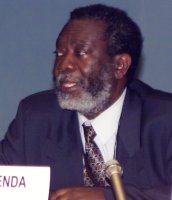
|
|
Chairman's Panel: Social Integration:
Basic Social Services for All
|
|
Emma
Bonino (Former EU Commissioner for Humanitarian Affairs, Italy),
Chair Rima Khalaf (Former Deputy Prime Minister, Jordan),
Gro Harlem Brundtland (Director General, WHO), Kevin Watkins
(Senior Policy Analyst, Oxfam, UK) Below right: Aminata Traore
(Former Minister of Culture and Tourism, Mali) said she was
sick and tired of the continuing condescending attitude towards
Africa and criticized World Bank policies for being completely out
of touch with reality and said things are getting worse. She advocated
putting more people in political office who can do something to
effect positive change.
|
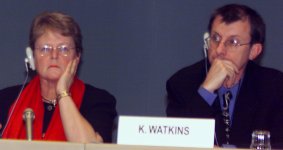 |
Gro
Harlem Brundtland (Director General, WHO), Kevin Watkins
(Senior Policy Analyst, Oxfam, UK)
|
|
Delegates
milling about in between Working Group sessions, where photos from
Plenary are being sold.
|

|
|
Click
here for ENB's coverage of the informals,
which includes the Summary
Report of WSSD+5 Informal Consultations held from 17-23 May
2000 (also in PDF
and Text formats)
Click
here for ENB coverage of the second PrepCom held 3-14 April in New
York.
The results
of the consultations can be found in the versions dated 23 May of
the two main negotiation documents:
L5
Rev.3 (Part I), as of 23 May 2000, 4:15 pm - Draft political
declaration to be adopted in Geneva. Also available in MS
Word version.
L.5/Rev.3
(Part III), as of 23 May 2000, 1:00 PM - Further actions and
initiatives to implement the commitments made at the Summit. Also
available in MS
Word version
Secretariat web site for the Special Session, which includes
information on the speakers list, agenda and programme, Chairman's
panels, practical information and latest news
The
Geneva 2000 Forum, held in conjunction with the Special Session,
will be a platform for sharing experiences through panels, discussions,
exhibitions, video, etc., with new and innovative approaches in
social and economic development policies and activities, and provide
a fertile ground for new ideas. The Forum is organized and hosted
by the Government of Switzerland. No less than 150 side events are
being planned as part of the Geneva 2000 Forum.
|

 Linkages Coverage of the World Summit for Social Development in Copenhagen
Linkages Coverage of the World Summit for Social Development in Copenhagen
 A summary of the major issues
A summary of the major issues
 Agenda for the Special Session
Agenda for the Special Session
 Secretariat web site with official
documents and information
for NGO participants
Secretariat web site with official
documents and information
for NGO participants
 Secretary-General's
Report on the Implementation of the Outcome of the WSSD
Secretary-General's
Report on the Implementation of the Outcome of the WSSD
 Summary
of the WSSD agreements
Summary
of the WSSD agreements
 Geneva 2000 Forum, to be held in conjunction
with the Special Session
Geneva 2000 Forum, to be held in conjunction
with the Special Session

|



